Selling property without real estate agents helps landowners save money and maintain control. When you sell land without a realtor, you eliminate commission fees while managing the entire process. This guide covers how to sell land without a realtor effectively. Soon you’ll be saying “I was able to sell my land for cash“.
Why Sell Land Without a Real Estate Agent?
Save Money on Commission Fees
Traditional real estate commissions range from 5-10% of the sale price. For a $100,000 property, avoiding 6% commission saves $6,000. You may still pay buyer agent commissions (2.5-5%), but eliminating listing agent fees significantly increases your net proceeds. When you save on commission fees, you keep more money from your successful sale.
When you work with a real estate agent, you have less direct control over key details like pricing and timing. However, when you learn how to sell vacant land without a realtor, you maintain full authority over the asking price and can consult with a real estate professional only when needed. This approach lets you hire a real estate attorney for legal guidance while avoiding lengthy commission negotiations with interested land buyers.
Maintain Control Over the Selling Process
Working without real estate agents gives you complete control over pricing, marketing, showings, and negotiations. You communicate directly with potential buyers, enabling faster decisions and transparent negotiations without agent scheduling conflicts.
Avoid Lengthy Traditional Sales Timelines
Traditional real estate transactions involve multiple parties and extended waiting periods. Selling land directly allows immediate showings and real-time offer responses, often expediting the process significantly.
Is Selling Land Without a Realtor Right for You?
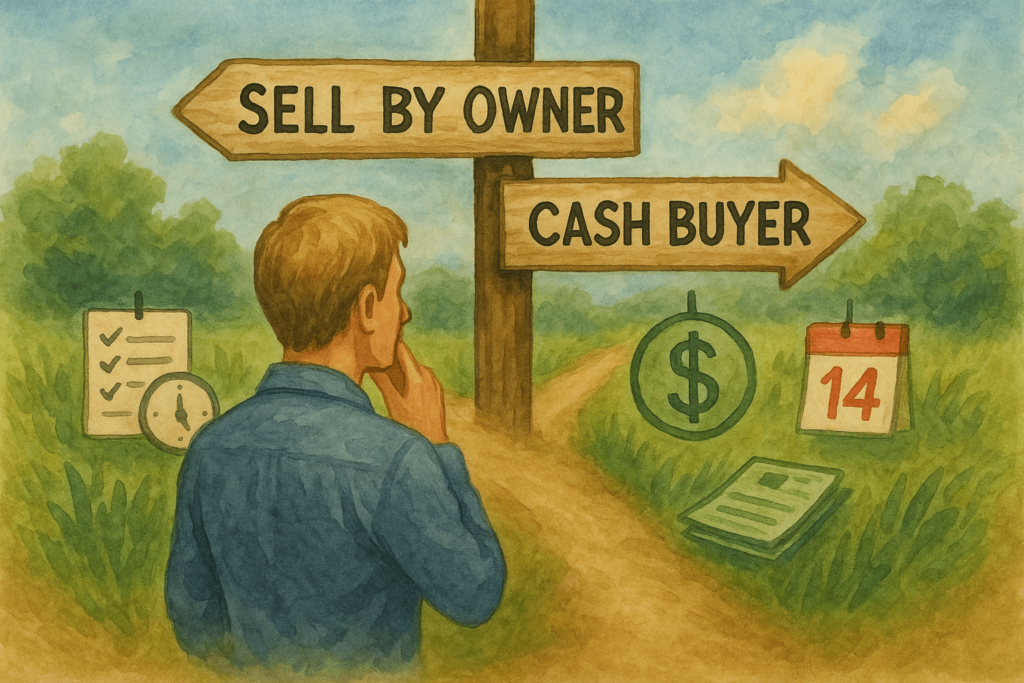
When FSBO Makes Sense for Land Sales
Choose FSBO When:
- You have 3-12 months to sell
- Property has clear title and access
- You can dedicate 10-20 hours weekly to marketing
- You want maximum proceeds
- You have real estate experience or strong research skills
Signs You Should Consider a Cash Buyer Instead
Choose Cash Buyer When:
- Need to close quickly in 7-14 days
- Property has complications (back taxes, liens, access issues)
- You lack time for intensive marketing
- Property is in probate or inherited with complications
- You’re not comfortable with negotiations
FSBO vs. Realtor vs. Cash Buyer: Complete Comparison

Time Investment Comparison
FSBO requires 10-20 hours weekly during active marketing. Real estate agents reduce your time to consultations and decisions. Cash buyers need minimal time – offers within 24-48 hours, closing in two weeks.
Cost Analysis and Total Expenses
FSBO expenses:
- Marketing: $200-$1,000 (signs, ads, photos)
- Legal fees: $500-$1,500 (attorney, title work)
- Buyer agent commissions: 2.5-5% (if offering)
Traditional sales involve full commission fees (5-10%) plus closing costs ($1,000-$3,000). Cash buyers offer 70-85% of fair market value but cover all closing costs.
Effort and Complexity Breakdown
FSBO requires market research, pricing, photography, advertising, inquiry management, and legal compliance. Real estate agents handle complex tasks while you make decisions. Cash buyers minimize complexity by managing all paperwork and procedures.
Essential Preparation and Market Timing

Research Comparable Sales and Determine Fair Market Value
Research Process:
- Check county assessor records online for recent sales
- Browse LandWatch and similar sites for active listings
- Focus on sales within 6-12 months for current market data
- Adjust comparables for road frontage, utilities, and unique features
- Consider hiring professional appraisers ($300-$800) for unique properties
Understanding the value of your land requires analyzing each parcel of land in your area for comparable sales data. Before marketing, you need to determine your property’s boundaries and establish fair pricing. The key details like survey information and title company contacts should be readily available when serious buyers express interest.
Planning these essential steps early in the process helps ensure your land’s value is properly represented to potential buyers.
Gather Necessary Documents and Legal Paperwork
Essential Documents Checklist:
- Property deed (proof of ownership)
- Recent survey or boundary documentation
- Property tax statements (last 2 years)
- Zoning information and permitted uses
- Utility availability reports
- Environmental assessments (if applicable)
- Title insurance policy
Best Time to Sell Your Land
Seasonal Strategy:
- Spring/Summer: Peak season for most land types, best weather for showings
- Fall: Ideal for hunting/recreational land buyers
- Late Winter/Early Spring: Agricultural land follows planting cycles
- Regional Variations: Consider local climate and buyer patterns
Monitor interest rates, regional development plans, and local economic factors. Time sales to coincide with positive economic indicators for better buyer interest and pricing.
Seasonal Market Trends and Timing Strategies
Create marketing timeline strategies starting with free methods like signs and Craigslist, then progressing to paid advertising if initial efforts don’t generate adequate response. This staged approach manages costs while testing market interest and helps attract buyers effectively.
Preparing Your Vacant Land to Sell Fast

Property Cleanup and Boundary Marking
Remove debris, trash, and unnecessary items from vacant land. Clear fallen trees and abandoned materials. Mow vegetation strategically to improve visibility while maintaining natural character.
Boundary Marking Methods:
- Install corner stakes with bright flagging at property corners
- Use temporary fencing for long boundaries
- Place “Property Line” signs at key points
- Consider professional surveyor for unclear boundaries
- Create walking path along perimeter for buyer tours
Creating Access and Making Land “Shovel Ready”
Access Preparation Steps:
- Verify legal access through deeds and easements
- Clear basic access road to potential building sites
- Contact utility companies for connection costs and timelines
- Research septic system requirements and costs
- Compile building permit requirements and setback rules
Addressing Environmental Concerns
Environmental Assessment:
- Check FEMA flood maps for flood zone designations
- Identify wetlands using National Wetlands Inventory maps
- Test soil quality if contamination suspected
- Document water sources (wells, streams, ponds)
- Research any environmental easements or restrictions
Understanding Land-Specific Requirements
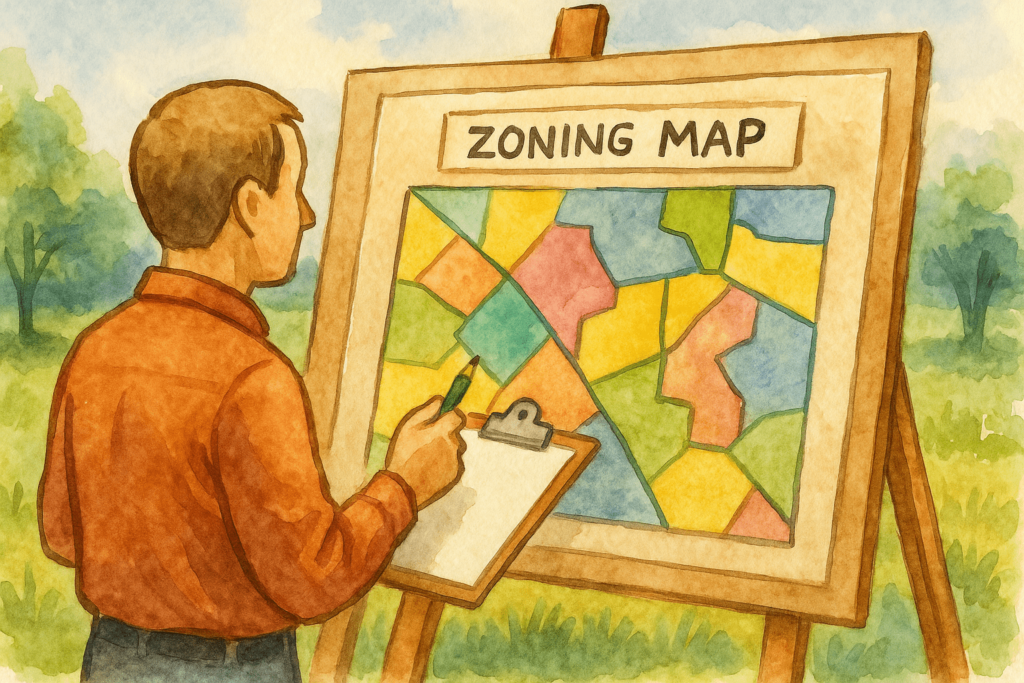
Zoning Regulations and Land Use Restrictions
Zoning Research Process:
- Contact county planning department for zoning maps
- Obtain official zoning designation letter
- Review permitted uses and restrictions
- Check setback requirements and building limitations
- Investigate potential for beneficial zoning changes
Utility Access and Survey Requirements
Utility Investigation Checklist:
- Electric company: Connection costs and timeline
- Water utility: Availability and hookup fees
- Sewer/septic: Requirements and costs
- Gas company: Service availability
- Internet/cable: Service options and costs
- Well water: Testing and permit requirements
Mineral Rights and What Conveys with Your Land
Rights Documentation:
- Review deed for mineral rights language
- Check for separate mineral rights deeds
- Understand water rights included with property
- Document timber rights if applicable
- Research any existing leases or agreements
Your Marketing Options for Selling Land Without a Realtor

Traditional Methods: Signs, Neighbor Letters, and Print Advertising
Sign Strategy:
- Cost: Under $100 for professional signs
- Placement: Visible from main roads, weather-resistant
- Information: “For Sale by Owner” with phone number
Neighbor Letter Campaign ($75-$350):
- Use county property records to identify neighbors within 1-2 mile radius
- Services like Regrid provide mailing addresses for $50-100
- Write professional letter mentioning nearby parcel for sale with price
- Mail options: DIY ($0.55/letter) or Click2Mail service ($0.75/letter)
- Target 100-500 nearby property owners
Modern sellers often combine online and offline marketing strategies, listing their land online through multiple platforms while using traditional methods to reach local real estate professionals and investors.
Online Platforms: Craigslist, Facebook Marketplace, and Zillow FSBO
Craigslist Strategy (Free):
Posting Process:
- Select “housing offered” → “real estate by owner” → choose “land” from dropdown
- Create compelling title highlighting best feature
- Upload up to 24 high-quality photos
- Critical: Renew every 48 hours – newer posts rank higher
- Prepare for “Is it still available?” messages
Facebook Marketplace Strategy (Free):
- Create listing under “Item for Sale” → select “Miscellaneous” category
- Set location to land’s actual location, not your home address
- Upload up to 10 photos with best image as featured photo
- Critical: Renew every 7 days to maintain visibility
- Download Facebook Messenger app for quick responses
Combine online and offline marketing strategies using social media platforms to reach interested buyers.
Zillow FSBO Limitations:
- Free to post but FSBO listings rank lower than MLS properties
- Buyers must specifically filter for “By Owner” properties
- 250-word description limit
- Less visibility than agent listings
Specialized Land Listing Websites and eBay Sales
Specialized Platforms:
- LandAndFarm: Rural/agricultural focus, hunting property buyers
- Lands of America: 3+ million acres listed, recreational buyers
- Land Search: Vacant land and building lots specialty
- eBay: Auction format can generate competitive bidding
Flat Fee MLS Listing Services
Flat Fee MLS Details ($100-$500):
- Upfront fee: $100-$500 for MLS listing
- Buyer agent commission: Still required (2.5-5% at closing)
- Syndication: Automatically feeds to Zillow, Realtor.com, Trulia
- Duration: Choose 6+ months for land
- Enhanced visibility: MLS listings rank higher than FSBO on major sites
Direct Sale to Cash Land Buyers
Cash Buyer Benefits:
- Closing timeline: 7-14 days from offer acceptance
- Purchase as-is: No repairs or cleanup required
- Handle complications: Back taxes, liens, probate situations
- Cover closing costs: No out-of-pocket expenses
- Offer price: Typically 70-85% of fair market value
Creating Your Land Listing and Marketing to List Land for Sale
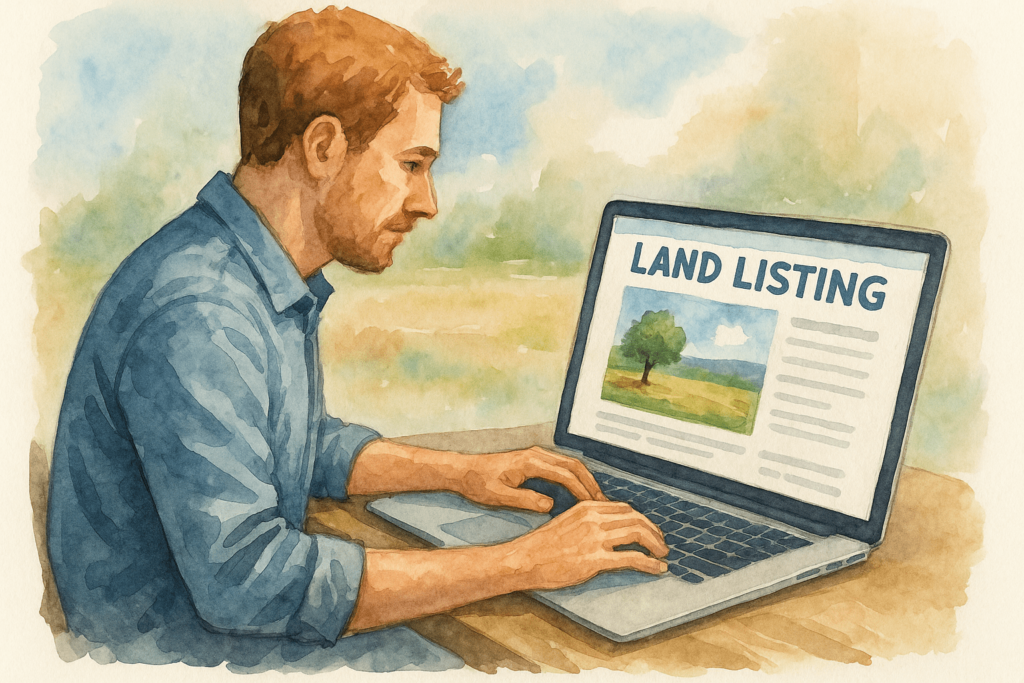
Writing Compelling Property Descriptions
Description Formula:
- Hook: Lead with most compelling feature (“Build Your Dream Home on 10 Scenic Acres”)
- Specifics: Include acreage, zoning, utilities, access type
- Benefits: Help buyers visualize uses and potential
- Logistics: Address practical concerns proactively
- Call to Action: Clear next steps for interested buyers
Common Buyer Questions to Address:
- What utilities are available and connection costs?
- Is the property suitable for building/septic systems?
- What are the zoning restrictions and permitted uses?
- How is access provided (deeded easement, public road)?
- Are there any environmental restrictions or benefits?
When you make your property appealing to those interested in buying, you increase buyer interest and create opportunities for counteroffers.
When you sell your property effectively, remember that selling without a realtor requires attention to key details like accurate descriptions and professional photography.
Taking Professional-Quality Photos and Drone Footage
Photography Guidelines:
- Timing: Early morning (7-9 AM) or late afternoon (4-6 PM)
- Equipment: Use tripod for stability, shoot in highest resolution
- Composition: Include wide establishing shots and feature close-ups
- Angles: Capture different perspectives showing various property aspects
Drone Photography Benefits:
- Aerial perspective helps buyers understand boundaries and topography
- Shows relationship to surrounding properties and roads
- Valuable for larger parcels where walking entire property is difficult
- Professional aerial shots increase perceived property value
Pricing Your Land Competitively
Pricing Strategy Options:
- Aggressive Pricing: 5-10% below market for quick interest and multiple offers
- Market Pricing: Based on comparable sales with room for negotiation
- Premium Pricing: 10-15% above market if property has unique features
- Consider Holding Costs: Factor in taxes, insurance, maintenance when determining minimum price
High-value properties may warrant premium pricing, but estimate your potential returns carefully before accepting an offer.
Managing the FSBO Sales Process
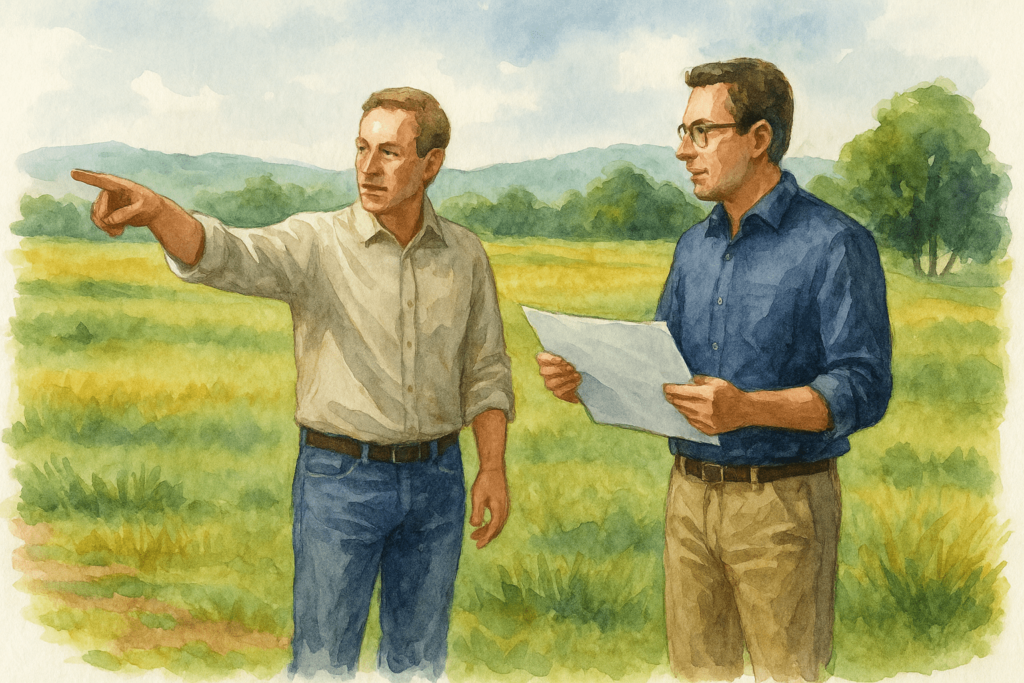
Safe Property Showing and Communication Practices for Inquiries
Safety Protocols:
- Phone Screening: Ask qualifying questions before scheduling showings
- Daylight Only: Schedule all showings during daylight hours
- Companion: Bring someone with you, especially for remote properties
- Meet at Property: Never invite strangers to your home
- Inform Others: Let someone know your showing schedule and location
Response Templates for Common Inquiries:
- “Is it still available?” → “Yes, the property is still available. Are you looking for land in this area for a specific purpose?”
- General inquiry → Provide basic details and ask about their intended use and timeline
Allow easy access and view opportunities for serious buyers while maintaining safety protocols.
Selling land without a real estate agent requires careful planning of each step. When selling your land successfully, you’ll need to navigate the legal complexities while ensuring you list land for sale effectively across multiple platforms. A land purchase agreement will formalize the terms, and marketing land through various channels helps attract qualified buyers who understand the property’s unique features and potential.
Qualifying Serious Buyers and Handling Negotiations
Buyer Qualification Questions:
- “What’s your intended use for the property?” (building, investment, recreation)
- “What’s your timeline for purchasing?” (immediate, 30 days, 6 months)
- “Have you purchased land before?” (experience level)
- “Do you have financing pre-approval or cash funds?” (ability to close)
- “Have you visited the area and seen comparable properties?” (market knowledge)
Negotiation Tactics to Expect:
- Lowball offers with quick closing promises
- Requests for seller financing or owner carry-back
- Demands for surveys, environmental testing, or improvements
- Multiple contingencies to provide “escape routes”
Red Flags – Walk Away When:
- Buyer refuses to provide proof of funds
- Multiple unreasonable contingencies
- Attempts to renegotiate after agreement
- Unprofessional or disrespectful communication
Maintaining Flexibility During the Process
Flexibility Areas:
- Closing Timeline: Accommodate buyer’s financing or planning needs
- Surveys: Negotiate who pays for required surveys
- Access: Allow reasonable access for inspections and planning
- Terms: Consider seller financing for higher sale price
- Contingencies: Reasonable contingencies for due diligence
The process requires significant time and effort, but maintaining flexibility helps navigate legal complexities and protects your interests.
Alternative Selling Strategies
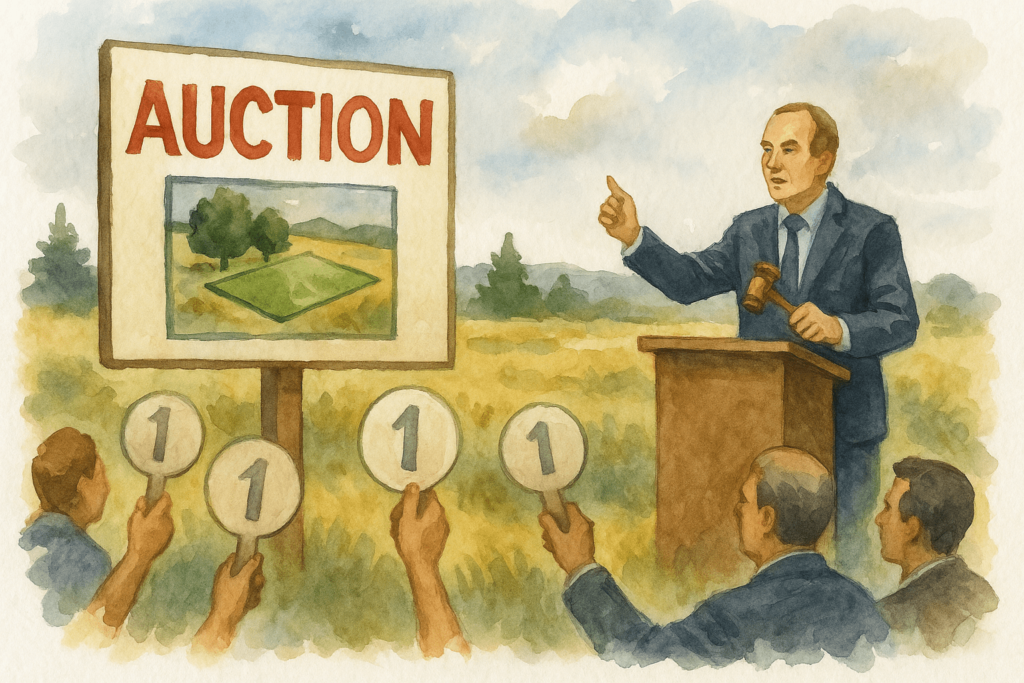
Owner Financing Options for Buyers
Owner Financing Structure:
- Down Payment: Require 20-30% down payment minimum
- Interest Rate: Market rate plus 1-2% premium for risk
- Term: 5-10 years with balloon payment or 15-30 year amortization
- Default Protection: Include acceleration clauses and foreclosure rights
- Legal Documentation: Use attorney-prepared promissory notes and mortgages
This approach works particularly well when selling land by owner, as it allows you to work directly with motivated buyers while maintaining control over the entire transaction process.
Land Auction Considerations
Auction Types:
- Absolute Auction: Property sells to highest bidder regardless of price
- Reserve Auction: Minimum bid requirement protects seller
- Commission: Auction companies charge 5-10% plus marketing costs
- Marketing: Substantial upfront advertising required for success
- Timeline: 60-90 days marketing before auction date
Legal Requirements and Closing Process

Purchase Agreements, Required Disclosures, and Legal Steps
Essential Contract Elements:
- Legal Description: Exact property boundaries and deed reference
- Price and Terms: Purchase price, down payment, financing arrangements
- Contingencies: Inspection, financing, survey, title approval periods
- Closing Date: Specific date with extensions if needed
- Rights Included: Mineral, water, timber, and air rights specifications
- Access: Deeded access or easement descriptions
State-Specific Disclosure Requirements:
- Environmental Hazards: Lead paint, asbestos, contamination history
- Natural Hazards: Flood zones, earthquake faults, fire areas
- Property Conditions: Known defects, soil issues, drainage problems
- Neighborhood: Planned developments, zoning changes, noise sources
Understanding key legal aspects and legal complexities helps ensure proper compliance throughout the deed transfer process.
Working with Real Estate Attorneys and Understanding Closing Costs
Attorney Services Include:
- Purchase agreement review and customization
- Title search review and issue resolution
- Deed preparation and recording
- Closing coordination and document execution
- Lien resolution and payoff coordination
Consulting with a real estate attorney when selling helps ensure proper legal compliance, especially since selling land without a real estate agent requires additional documentation and oversight.
Typical Seller Closing Costs:
- Title Insurance: $300-$1,000 (varies by property value)
- Recording Fees: $50-$200 for deed and document recording
- Transfer Taxes: Varies by state/county (0.1%-2% of sale price)
- Attorney Fees: $500-$1,500 for legal representation
- Survey Costs: $300-$1,500 if buyer requires new survey
- Wire Transfer Fees: $25-$50 for secure fund transfer
Wire Transfer Security:
- Verify all banking information directly with title company by phone
- Never rely on email instructions for wire details
- Confirm receipt before signing final documents
- Use only established title companies with good reputation
The closing process involves multiple steps, and understanding these key legal requirements helps ensure a smooth transaction.
Tax Implications and Capital Gains Considerations
Capital Gains Calculation Example:
- Sale Price: $150,000
- Original Purchase Price: $50,000
- Improvements/Costs: $25,000
- Tax Basis: $75,000 ($50,000 + $25,000)
- Capital Gain: $75,000 ($150,000 – $75,000)
Tax Rate Structure:
- Short-term (under 1 year ownership): Ordinary income tax rates (22%-37%)
- Long-term (over 1 year ownership): Capital gains rates based on income:
- $0-$44,625 income: 0% capital gains rate
- $44,626-$492,300 income: 15% capital gains rate
- Over $492,300 income: 20% capital gains rate
- Long-term (over 1 year ownership): Capital gains rates based on income:
Tax Planning Strategies:
- Installment Sales: Spread tax liability over multiple years by receiving payments over time
- 1031 Exchanges: Defer taxes by purchasing replacement investment property
- Timing: Consider selling in lower income years to reduce tax rates
- Professional Advice: Consult tax professionals for complex situations
Frequently Asked Questions About Selling Land FSBO
How long does selling land take? Expect 3-12 months for most land sales, varying by property type, location, pricing, and market conditions.
Do I need surveys? While not always legally required, buyers often request surveys to verify boundaries. Consider ordering surveys ($300-$1,500) for properties with unclear boundaries.
What about access issues or back taxes? Many issues can be resolved with professional assistance. Title companies can handle lien payoffs at closing.
How do I handle multiple offers? Evaluate total terms, not just price. Consider buyer qualifications, timelines, contingencies, and financing arrangements.
Can I sell land with liens or back taxes? Yes, though it requires additional steps. Title companies can handle lien payoffs at closing, and buyers sometimes accept properties with existing tax obligations if priced accordingly.
What’s the escrow process for land? Escrow companies hold earnest money deposits and coordinate document exchange between buyers and sellers.
How much should I price below market value for quick sale? Consider 5-10% below comparable sales for quick interest. More than 15% below market may signal problems to buyers.
What if neighbors contest my boundaries? Hire a licensed surveyor to establish definitive boundaries. Resolve disputes before marketing to avoid complications during sale.
Should I allow buyer financing contingencies? Yes, but limit timeframes (30-45 days) and require pre-approval letters. Cash offers provide more certainty but may be lower.
How do I verify a cash buyer is legitimate? Request proof of funds, check references, verify business licenses, and use established title companies for closing.
Summary: Your Next Steps to Sell Land Successfully
Action Steps:
- Week 1: Gather documents, research comparable sales, determine pricing
- Week 2: Prepare property (cleanup, boundary marking, access improvement)
- Week 3: Create marketing materials (photos, descriptions, signs)
- Week 4: Launch marketing campaign across multiple platforms
- Ongoing: Manage inquiries, schedule showings, negotiate offers
Create compelling marketing materials highlighting unique features. Implement safe showing procedures and qualify buyers carefully. Work with professionals including attorneys and surveyors for legal compliance and protection.
Monitor results and adjust strategies based on market response. Consider alternative methods including cash buyers if initial approaches don’t generate acceptable results within 90 days. The next steps involve maintaining consistency in your marketing efforts while staying prepared for accepting an offer when the right buyer appears.
Skip the Hassle: Get Your Cash Offer Today
If you prefer hassle-free transactions, consider reputable cash land buyers. We purchase land quickly, handling all paperwork while providing fair cash offers. Our process takes as little as 14 days from contact to closing.
Contact us for no-obligation consultations and cash offers. We buy land in any condition nationwide, providing speed and convenience traditional methods can’t match.
